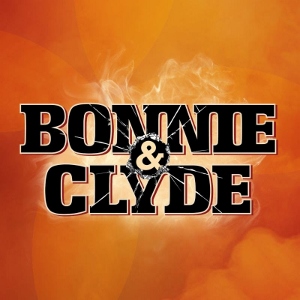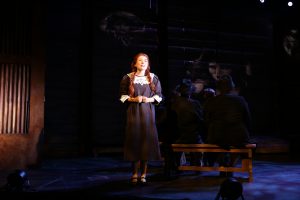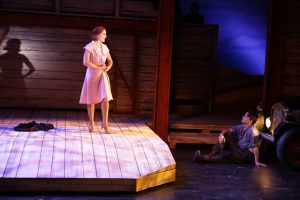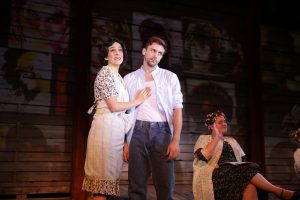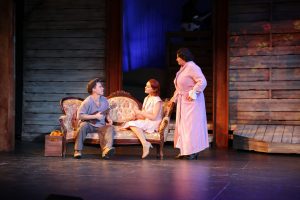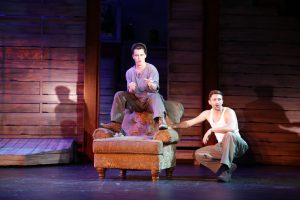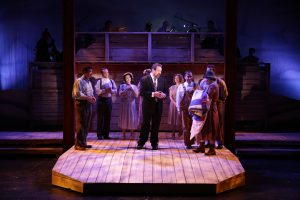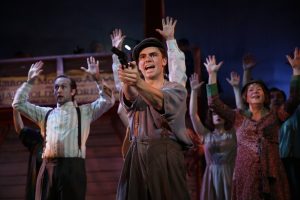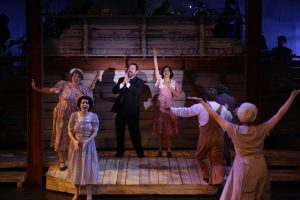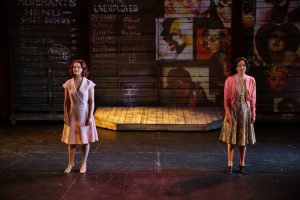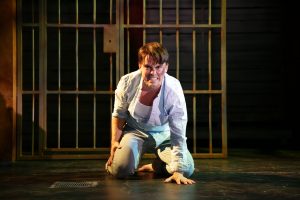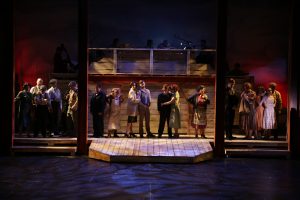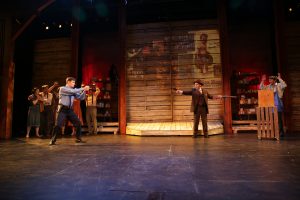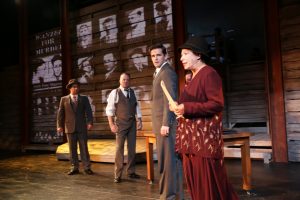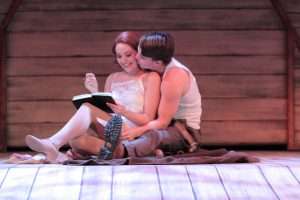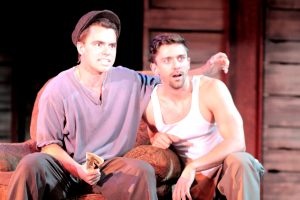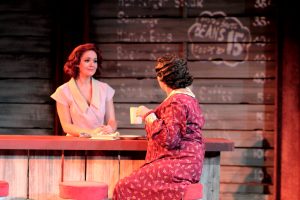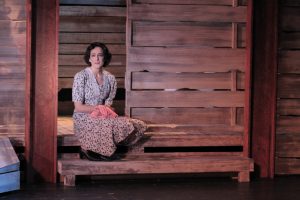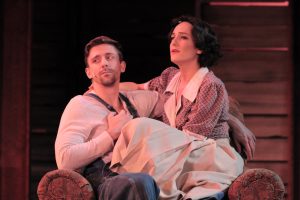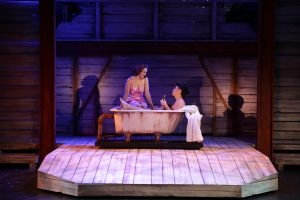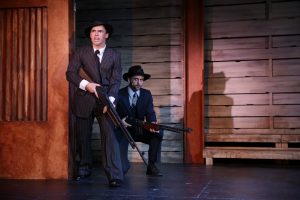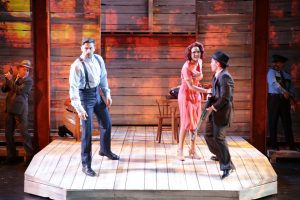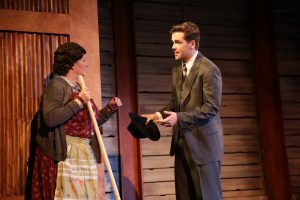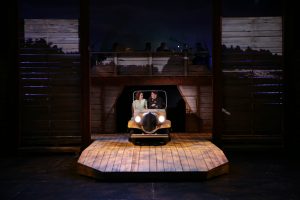A SURE(GUN)FIRE HIT
The team of Bonnie Elizabeth Parker and Clyde Chestnut Barrow, the most famous robbing, murdering, loving couple in U.S. history, is as unlikely a subject for a musical as Sweeney Todd. From their first meeting in West Texas through their tumultuous courtship and romance; from their brief, history-making crime spree to their fateful final drive through Louisiana; this thrilling and sexy show evokes both the 30s’ Depression era and the Southern locale, thanks to Frank Wildhorn’s score, which combines Rockabilly, Blues, Gospel, Broadway and more.
Wildhorn is infamous for his 80s’ sounding, pop-laden scores incongruous to the material he’s writing about (The Scarlet Pimpernel, Jekyll & Hyde. The Civil War), but with Candlelight Dinner Theatre’s bang-up production of Bonnie & Clyde, Wildhorn’s best score yet is given the best treatment it could get. In addition, you get chases, escapes, poetry, family, prison assaults, dancing, betrayal, super-sexy bandits, and lots and lots of gunfire. (And, shockingly, your delicious meal and attentive waiter service at your table is included with the nominal ticket fee.)
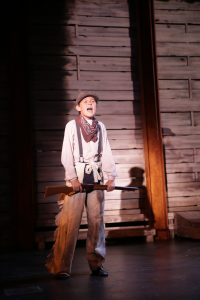 How can two small-town nobodies search for meaning at the height of The Great Depression? Patronize a soup kitchen, sell apples, get a job, hope for a “new deal”? Naw — that’s suckers’ stuff; especially in the Dust Bowl where banks are as dry as the soil. How about robbing mostly stores and gas stations and a few banks? Of course, posing with their machine guns alongside their speedy hot-rod (an 80-mph Ford) romanticized the young, attractive couple, but — unlike Robin Hood — their charity was themselves and their kin. Even with both cops and civilians as unintended casualties, the couple nonetheless became symbols of poor Americans who felt like outsiders up against an uncaring system. That, and a sneaky ambush by the feds, was enough to make Bonnie, who wanted a career like Hollywood vamp Clara Bow (the “It Girl”), and Clyde, who envied Al Capone his thug life, heroes in hard times, martyrs of the John Dillinger or Billy the Kid caliber. Thanks to Arthur Penn’s 1967 film starring Warren Beatty and Faye Dunaway, they won new fame decades later.
How can two small-town nobodies search for meaning at the height of The Great Depression? Patronize a soup kitchen, sell apples, get a job, hope for a “new deal”? Naw — that’s suckers’ stuff; especially in the Dust Bowl where banks are as dry as the soil. How about robbing mostly stores and gas stations and a few banks? Of course, posing with their machine guns alongside their speedy hot-rod (an 80-mph Ford) romanticized the young, attractive couple, but — unlike Robin Hood — their charity was themselves and their kin. Even with both cops and civilians as unintended casualties, the couple nonetheless became symbols of poor Americans who felt like outsiders up against an uncaring system. That, and a sneaky ambush by the feds, was enough to make Bonnie, who wanted a career like Hollywood vamp Clara Bow (the “It Girl”), and Clyde, who envied Al Capone his thug life, heroes in hard times, martyrs of the John Dillinger or Billy the Kid caliber. Thanks to Arthur Penn’s 1967 film starring Warren Beatty and Faye Dunaway, they won new fame decades later.
This 2011 Broadway flop, with book by Ivan Menchel and lyrics by Don Black, actually celebrates and has us empathizing with the outcast outlaws who fiercely loved each other … to death; their bullet-riddled bodies appear in the opening scene (given the money they stole, it’s simply too apropos that their true-life car is on display at a casino in Primm, Nevada). The book tries to be both homage to the struggling thieves and an indictment against the system responsible for the creation of our anti-hero heroes (“Made in America,” a still-relevant rationale). Although the book never truly melds the two concepts, the dialogue is largely cliché-free and surprisingly funny at times. Sixteen pretty terrific tunes include nice ballads which don’t often match the urgent trajectory of the story, but that doesn’t matter at wonderfully persistent and contagiously convincing 150-minute staging honors the show’s “sympathy for the devil” with a more-than-persuasive Inland Empire premiere that crackles like machine-gun fire.
A young girl with celluloid fantasies (“Picture Show,” sung by “Young Bonnie” Serena Thompson), Bonnie lost her pa and has moved to West Texas with her mamma, Emma (powerfully emotive Jennifer Lawson). Now a still-married waitress in 1930, 20-year-old Bonnie (striking, sexy, vocal-powerhouse Callandra Olivia) meets a jailbreaking Clyde (virile and vigorous Beau Brians) when he offers to repair her car for a lift to Dallas. The fateful encounter between two drifting dreamers (“This World Will Remember Me”) triggers a spree-killing anti-romance. Trapped by sixteen years of bad-boy behavior (including purportedly killing a fellow con who raped him), Clyde argues that he just can’t earn an honest living: The authorities keep messing with the jailbird’s job prospects. “Freedom is something I gotta steal,” he philosophizes.
Clyde’s rat-a-tat reign of terror includes his brother Buck (Nic Olsen) and his respectability-craving, Bible-thumping wife Blanche (Katie McGhie), whose anguished ambivalence about her hubbie’s “get rich” schemes adds a psychologically probing aspect to the musical. The odd man out is nice-guy deputy Ted (beautiful baritone David Šášik), Bonnie’s childhood chum(p) who pines for her damaged goods (“You Can Do Better Than Him”). A preacher (appropriately coarse Michael Lanning) arrives to remind us that “God’s Arms Are Always Open,” a lesson lost on the two kids.
What follows, of course, are increasingly brazen robberies, with Clyde sadly meting out frontier justice to anyone “trying to be a hero.” Bonnie, delighted that the tabloids proclaim her a “ravishing redhead,” has an attraction to Clyde that appears as hybristophilia, the condition of sexual arousal by a partner known to have committed an outrage such as armed robbery; it’s also known as “Bonnie and Clyde Syndrome.”
Nicely shaped by music director Ryan O’Connell and his smokin’-hot live band, Wildhorn’s always suitable songs — even those that marinate in amoral resignation, such as the couple’s “You Love Who You Love” — often rise to their sordid occasions, notably Bonnie’s winsome anthem “How ’˜Bout a Dance?” On Chuck Ketter’s clever set — utilizing moving roadsters and Japanese screens that resemble an Okie lean-to — the chemistry and charisma of Mr. Brians and Ms. Olivia could light up Claremont.
In an industry that has lately prioritized acting potential over the ability to hold a tune, it’s refreshing to see a production that recognizes that it’s possible to have both (and only one of the actors is in Equity, which makes an argument for more primarily non-Equity productions in the L.A. area).
While the eventual demise of the lovers is strangely sentimental — romanticizing two sociopathic soulmates who attained apotheosis in artillery — the journey to that finale is a witty, swinging, love-filled, wild ride that should not be missed.
photos courtesy of Candlelight Pavilion (click on photo for larger version)
meals served before the show begins
doors open on Fri and Sat at 6; Sun at 5; Sat and Sun at 11
ends on October 13, 2018
for tickets ($30-$74 includes meal), call 909.626.1254 x 1 or visit Candlelight
